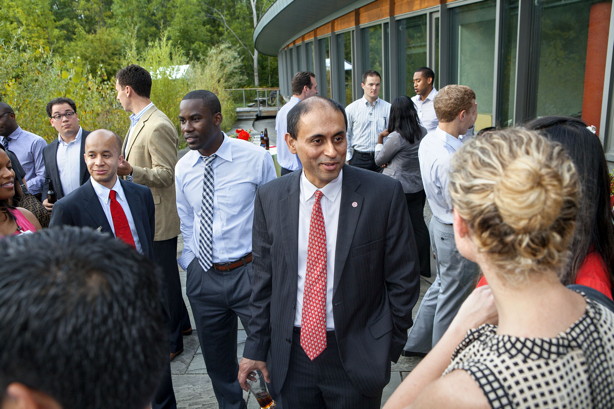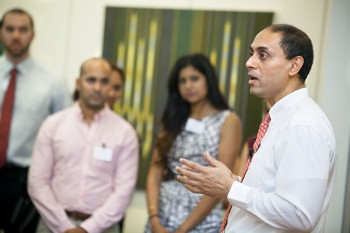COVER STORY
Soumitra Dutta

Johnson Dean Soumitra Dutta chats with returning MBA students at a September 2012 "welcome back" event held at Cornell's Lab of Ornithology.
What's the most surprising thing you've heard from a student or faculty member in the past six months?
When people hear that my wife and I moved from Paris to Ithaca, they usually say, "That must have been a tough move for you." But it was actually a very easy move. We were living in a very small town outside Paris called Fontainebleau, so in a sense we were used to a small-town environment in France also, and Ithaca is a beautiful place. In terms of living it's actually quite similar. The community in Ithaca has made the move easier, and the fact that we have Wegmans [supermarket] also made the food side much easier.
What significant change do you see in the near future for your college?
Johnson, as a business school, will have to work in a much more integrated fashion with other discipline-based schools in the university. On the big issues society is facing, be it energy, sustainability, climate, inequality, jobs or poverty, business is being asked to collaborate with government, the private sector, the public sector and civil society.
Cornell Tech is a very good example of this. Ultimately what the city wants is the creation of new jobs of a specific kind – technology-intensive, and technology-intense, educated people who are creating jobs. To do that, you need to integrate and work much more closely with engineering and computer science, and business schools will have to be much more proactive in that.
There are things we can do with Weill Cornell, with the College of Veterinary Medicine, with the Law School, with CALS, in agriculture and other areas. So lots of different possibilities exist – not just in engineering and computer science.
What is one thing most people don't know about your college?

Johnson Dean Soumitra Dutta chats with returning MBA students at a September 2012 "welcome back" event held at Cornell's Lab of Ornithology. See larger image
How strong and how deep Cornell is in the field of business. Business education is delivered in four schools – the Dyson School, Johnson, the School of Hotel Administration and ILR – and also some in health management in Human Ecology, and in financial engineering and operations research in the College of Engineering.
If you look at the sum of these different parts, it places Cornell as one of the biggest top-tier business education universities in the United States. We are actually a major player in the world of universities in business education. That's a strength we have to project more aggressively, more smartly and leverage more for synergies.
What belief you had about your job as dean was proven wrong?
I expected that I would have the first three or four months to come in and just listen, observe and learn, and then formulate and describe my vision for the school. Because the creation of Cornell Tech was already happening, I quickly realized I did not have that luxury. So I had to move very fast to position Johnson as a core member of the Cornell Tech project. I arrived in late July, and by August I had held five workshops with faculty and staff to start discussing and building momentum inside the school around the Cornell Tech initiative. That made the first six months very intense, although we made a lot of good progress in a fairly short period of time: We have articulated the vision for the school, and we managed to get the key stakeholders and our alumni in line behind the vision.
What's the most profound thing you've learned from one of the other deans at Cornell?
I have to pace myself a little bit … and not try and do too many things at the same time. It's very important to balance my personal health and family life with the professional side, because the professional side can be all-consuming. These are big jobs and big opportunities, and they will take 100 percent of the time if you give 100 percent. And the challenge appears to be to balance it so that you don't damage your health or your personal life.
What's the biggest obstacle to success for your school right now?
Resources – our endowment is very small, only around $167.5 million. We have an ambition of being in the top 10, and most of the top 10 schools have endowments greater than $500 million, and a few of the leaders have endowments greater than $1 billion.
So we're really very under-resourced in terms of our endowment compared to our competitors, and that creates challenges of hiring faculty, giving scholarships to students, and just being able to do the kinds of things we need to do to establish and maintain our reputation as a top business school.
Who are you when you walk out the door of your office, or in the door at home?
I try to, of course, balance multiple roles, and the roles are me as a dean of this institution; me as a professor, as a researcher in my area of expertise; and me as a husband and family man at home. And it's a tough balance. Going forward, I have to try and make sure that I'm able to devote time adequately across the three roles. And when I leave the office, to some degree you never leave – because you have emails, and you have iPhones, and the office sort of follows you into the home. But I do try to make the time, make the effort to meet with friends socially with my wife, go on walks in Cayuga Heights, and enjoy some of the nature around. I like to paint and I haven't done any of that since I came to Ithaca, so I'd like to restart some of that.
The DeanName/title: Soumitra Dutta, the Anne and Elmer Lindseth Dean and professor of management At Cornell since July 2012 Dean since July 2012 Area of expertise: Innovation and technology strategy The Samuel Curtis Johnson Graduate School of ManagementPopulation: 95 faculty, 1,197 students Areas of future growth: Initiating a broadly conceived strategy for Johnson's presence in Cornell Tech to both grow activities and strengthen Ithaca-based programs Endowment: $167.5 million (as of June 2012) Cornell Now campaign goal/amount raised: $95 million/$58.3 million (as of March 2013) |
<<View entire story as one page>>